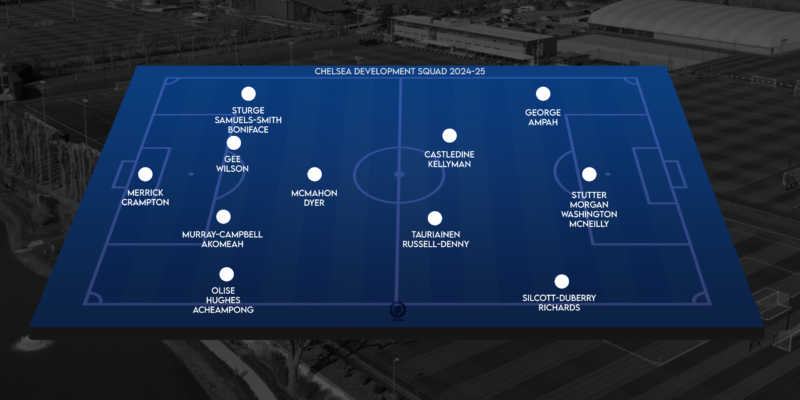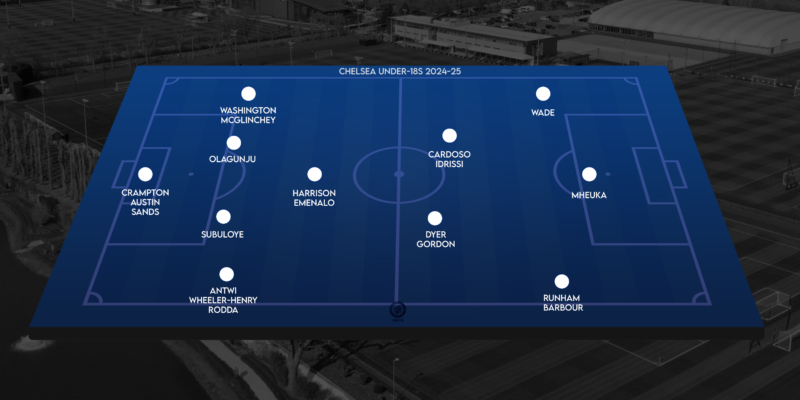On Friday night Chelsea’s Development Squad kick off a new academy season at home to defending Premier League 2 champions Tottenham Hotspur at Kingsmeadow. The following morning, Hassan Sulaiman’s Under-18s get under way against Brighton as they seek to retain their South league title and go one better than last year, when they finished runners-up for the national crown.
To preview a new campaign, though, is to reflect on as tumultuous and surprising a summer as the academy has known in the modern era. The departures of Neil Bath and Jim Fraser sent shock waves through the game, reaching well beyond the quiet boundaries of the Cobham training ground, and leaving an uncertain short-term future in their wake.
Fraser had been promoted to Head of Youth Development barely eighteen months earlier, moving up into the role after Bath shifted into a newly-created Director of Football Development and Operations role with an expanded remit, auguring suggestions of a strong and secure future as they established and worked towards Vision 2030 together. Often misappropriated as a first-team recruitment strategy, this was the next step of an enduring project to ensure the club continue to produce England’s top talents throughout all age groups, to supply the men’s team with a steady flow of top-level talent, and to make Cobham the place to be for players across Europe.
And it’s hardly as if they were falling behind in that regard either. When Dominic Solanke signed for Tottenham last weekend for £60m plus add-ons, it took the Premier League’s total spend on players with a Chelsea academy education past £350m since 2022 alone. If Newcastle are successful in their pursuit of Marc Guehi, it’ll surpass £400m, while the Blues themselves are captained by Reece James and count Levi Colwill as a key part of their plans for the new season. Those who are unwanted and who are being (or have been) forced out are moving up to Champions League-calibre clubs; a standard Chelsea are still yet to reach in the same time period.
Regardless, changes were made, and the academy is now under the combined leadership of Jack Francis, who steps up from Academy Manager to Head of Academy Operations, and Glenn van der Kraan, who comes in as Academy Director from Man City, where he spent four years working with their 9-14 age group following a long run at the storied Feyenoord academy. Delroy Ebanks joins from Newcastle (having been a long-time West Ham scout) in a senior recruitment capacity, with Ayo Durojaiye from Arsenal also coming in to work on younger age recruiting, and a new direction of travel will be established in due course. The manner of the change was certainly unsavoury, but there is a cautious optimism that this era’s mix of old and new will be as prosperous as the setup it inherited. It will certainly take a long time to feel the real effects of those substantial changes, though, and the 2024-25 season might not be immediately reflective of the long-term.
Where there has been recognisable change, however, is in the Development Squad dugout. Mark Robinson has moved on to an exciting new senior management job at Burton Albion after two years with Chelsea, and in his place Filipe Coelho has been hired, marking the first time the club’s Under-21/Reserve team has ever been led by an overseas coach. A long-time servant of Benfica’s elite youth system, he spent last season working wonders with Estoril’s Under-21 team, and comes to England with a strong reputation for working with high-level young players and helping them round out their games on the journey into senior football.
He inherits a deep and rich group of graduating Under-18s and has faced an immediate summer challenge to work with more players than Enzo Maresca over the road; the pre-season schedule has been split in half, with the ‘normal’ 20-strong Dev Squad rotating fixtures with the ‘Loan Group’ that has included Trevoh Chalobah and Alex Matos and Tino Anjorin and Bashir Humphreys and Omari Kellyman and several more who are not expected to play a meaningful part in the PL2 this term.
Defeats to Mansfield and Stevenage first-teams provided stern tests, as did hard-fought draws versus Boreham Wood and Wycombe, while wins against Colchester and Brentford B towards the end of the six weeks will give plenty of positivity going into the big kickoff on Friday. The squad depth available to Coelho is as good as it gets in the league, and the aim is certainly to win the lot, as they will also be back in the Premier League Cup and International Cup this term, cup competitions they were well-positioned to challenge for in 23-24 before running out of steam.

Quite how much they’ll benefit – if it’s deemed a benefit – from the overflow of expected departees who don’t find a move before the summer window closes is anyone’s guess, but there is already a real challenge to get enough minutes into everyone without the added burden of unexpected additions. There also has to be a meaningful opportunity for the best of Sulaiman’s Under-18s to get a chance to move on up when the challenge presents itself, as one or two have shown themselves capable of themselves this summer.
It’s very much a transition to a new group for the 18s; their nine-strong first-year intake last summer has welcomed eleven newcomers to join them this year, all of whom made at least one league appearance last season to make the official step up that bit easier. However, Kiano Dyer is unlikely to play anything other than Youth Cup football at this age group, Ollie Harrison will have eyes on joining him in the Dev Squad after a first-team flirtation under Pochettino, and Shim Mheuka – who isn’t 17 until October – scored three goals for Coelho’s group in the last week and will be hungry for more.
Half of last year’s intake had a heavily disrupted season and come into 2024-25 hoping for form, fitness and freshness; Leo Cardoso and Marcell Washington made just four starts combined, while Saheed Olagunju and Kai Crampton saw most of their playing time come in the Under-17 Cup, and Shaun Wade was deployed as an impact sub. They now have to take the lead role and sync with a gifted and capable group that, despite the loss of Ryan McAidoo and Rio Ngumoha, have the quality and versatility to pack a punch.

They began their summer programme with a slender defeat to Farense’s Under-23s in Portugal before high-scoring wins against Nottingham Forest and Wolves (with five more goals for Mheuka) sandwiched a draw against Sheffield United. Saturday’s defeat to Man Utd saw Under-16 forward Chizzy Ezenwata score twice (scoring three pre-season goals in total), one of a clutch of players in his age group to look out for early and often as they continue to carve out quite a reputation for themselves as three-time treble winners between Under-13 and Under-15 levels.
The impact that generation can offer to the Under-18s is the true wildcard this season; on paper, the group might look like a player or two light compared to those who’ve graduated to Under-21 level now, at least in terms of attacking versatility and depth, but when keenly supplemented by a squad featuring nine players with England youth representation, they will feel they have everything they need to challenge for the same honours they won last season, and more besides.
Sometimes it’s a case of the more things change, the more they stay the same when it comes to youth football in England or at Chelsea. The landscape ahead of the season opener at Tottenham on Friday feels very different to the scene 89 days earlier against the same team, but when the first whistle sounds on the new season, in a new kit, with a new manager and some new players, it might well feel like nothing’s really changed at all. The curtains go up at 7pm and you can stay fully on top of everything that happens all season on social media @chelseayouth.
